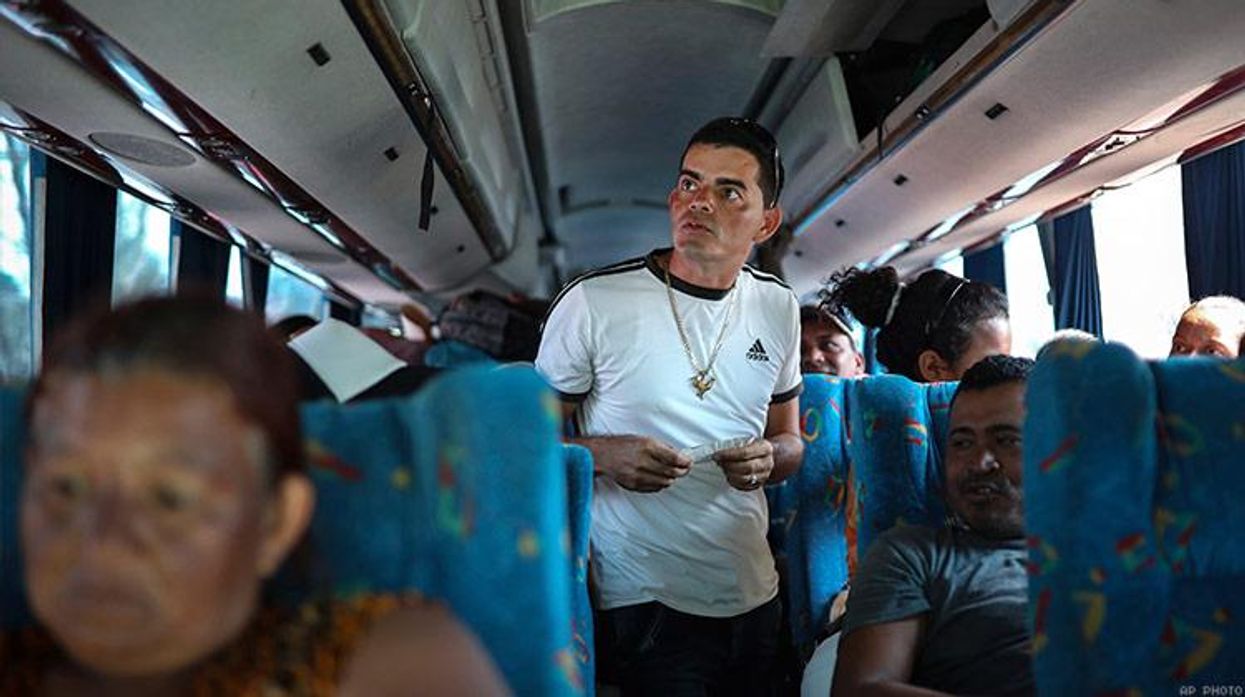World
Migrant Caravan Includes LGBT Asylum-Seekers

Anti-LGBT violence is widespread in Honduras, the home country of many of the migrants.
April 09 2018 6:27 PM EST
trudestress
By continuing to use our site, you agree to our Privacy Policy and Terms of Use.

Anti-LGBT violence is widespread in Honduras, the home country of many of the migrants.
The migrant caravan coming to the U.S.-Mexico border from Central America, which has been so demonized by Donald Trump, includes a significant presence of LGBT people who have been victims of persecution in their native countries.
In a Facebook video (watch below) posted by the nonprofit organization Neta, in partnership with caravan organizer Pueblo Sin Fronteras (People Without Borders), members of the caravan say they represent a diversity of sexual and gender identities. They call for an end to violence and discrimination against women and LGBT people in their home countries and elsewhere.
The largest proportion of caravan members are from Honduras, with some from El Salvador and Guatemala as well, The Hill reports. All three countries have a high rate of violence against LGBT people, according to various human rights groups.
Human rights groups also say that U.S. officials have been blocking attempts to apply for asylum here, whether migrants are fleeing anti-LGBT or other types of persecution. Last year, several migrants filed suit against the Department of Homeland Security, alleging that Border Patrol and Customs agents "are illegally turning away asylum seekers at the U.S.-Mexico border," The Hill notes.
The reality of the caravan differs sharply from how it was characterized by Trump, organizers say. "The purpose, they say, is not to encourage Central American migration, nor to 'storm' the U.S. southern border," The Hill reports. "Rather, by traveling in large numbers, the caravans provide protection for Central Americans who are vulnerable to abuse as they cross through Mexico."
This abuse includes "extortion, rape or even kidnapping by gangs and drug cartels," according to The Hill. And no, caravan members aren't the perpetrators of rape, as Trump claimed last week. "There is almost no actual evidence on which to base this claim," The Washington Post reports, adding. "There don't appear to be any mainstream news reports of a rape epidemic taking place in the caravan. The only mentions of rape with regard to the caravan in recent days, in fact, refer to criminal behavior that the migrants have been trying to escape in their home countries or along the route."
There have often been migrant caravans crossing from Central America through Mexico during the Christian Holy Week (the week before Easter), when this caravan set out. And while some members do intend to seek asylum in the U.S., the larger purpose of the caravan is to call attention to violence and persecution in members' home countries.
While the caravans have traditionally consisted of 200 to 300 people, this year's swelled to about 1,500 due to developments in Honduras, "where gang violence has made the murder rate one of the highest in the world," The Arizona Republic notes. Also, there has been outrage in Honduras over the result of last year's presidential election, in which incumbent Juan Orlando Hernandez, a U.S. ally, narrowly defeated challenger Salvador Nasralla. Many believe the election was stolen.
The Latin America Working Group, a coalition of human rights organizations, recently issued a report calling the election fraudulent, documenting persecution of the Honduran people, and denouncing U.S. policy toward the nation. "We are reaping what we sow in Honduras: a failure of the international community including the United States to take a strong stance against repression is intensifying the human rights crisis in the country and contributing to the outflow of refugees," executive director Lisa Haugaard said in a press release.
Charlie Kirk DID say stoning gay people was the 'perfect law' — and these other heinous quotes